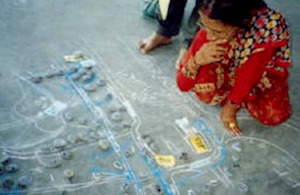DFID Research: equitable irrigation for the poor of Nepal
Getting a fair share of water improves the livelihoods of poor farmers.

Participatory social and resource mapping is used in Nepal to understand irrigation systems. Picture: Mott MacDonald
Ten years after construction of the Sunsari Morang Irrigation Project in Nepal, many people despaired of its poor performance. They were resigned to poor service, an unreliable water supply and repeated disputes. They saw no point in even attempting to work together. But within 2 years with a carefully focussed multi-disciplinary approach, confidence was restored in the project, resulting in reduced wastage of water and improved relationships.
Irrigation has many direct and indirect impacts on the livelihoods of the poor and, if used correctly, is an important driving force in poverty reduction. Unfortunately its direct impact is severely reduced by poor management of water distribution at a local level. Even within small areas some farmers can get an adequate supply of water while others have insufficient water and may even be forced to abandon their crops.
Researchers from Mott MacDonald worked with NGOs, irrigation departments and farmers, and investigated how Water Users’ Associations (WUAs) share water at local level. They evaluated what impact this has on the livelihoods of the poor, and then helped the WUAs to improve distribution of water amongst their members. This entailed providing considerable support through local NGOs to strengthen WUAs and embed them in their community.
The approach was to introduce measures to improve technical and management procedures, designed by well informed, involved stakeholders. These measures are then implemented by a strong, ‘embedded’ and respected local institution, working within an appropriate external environment, which gives WUAs the necessary authority and support, and assures them of a predictable water supply.
How farmers have been helped
This has had a positive impact on the livelihoods of many poor farmers who are now assured a timely and reliable supply of water. The impacts include:
- crop productivity - those at the tail (who are predominantly poor) previously had very unreliable water supplies and suffered from low yields. These farmers on the social and physical margins of the system were particularly appreciative of the improved supplies
- time saving - avoiding time wasted on unproductive activities such as guarding one’s own supply, removing blockages and illegal outlets upstream; or extra time spent in the field due to uncertainty over when water will reach one’s field, or because of a very low flow rate
- better social relations - an awareness and understanding of the role of the WUAs and a growing willingness to participate in them, and better relations with neighbour with fewer unresolved conflicts, thereby encouraging cooperation in other activities
Farmers have already benefited from the research. They gained particularly through the better social relationships resulting from good water management: Shanti Devi Uraw, an extremely poor widowed farmer in Nepal told researchers that she could now get water for her crops, that she was sufficiently respected to take part in village dispute resolution committees and that she had saved time in irrigating her land.
Through this systematic and comprehensive approach, guidelines for establishing successful and sustainable WUAs have been used in other areas and countries. Similar projects have been conducted or are planned in Nepal, Kyrgyzstan and India, Uzbekistan and China.